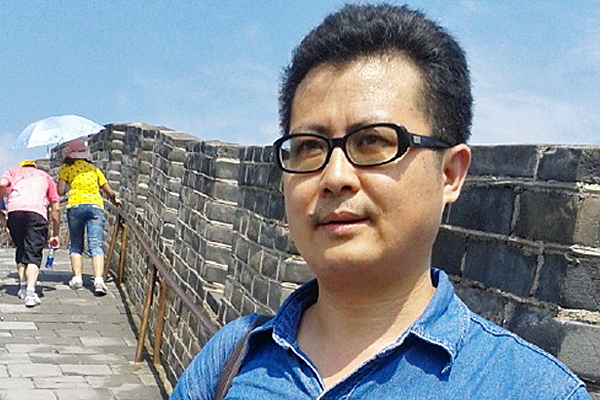
Guangdong rights activist Guo Feixiong in an undated photo. Photo courtesy of activists
Jailed Chinese rights activist Guo Feixiong has now been on hunger strike in Guangdong’s Yangchun prison for more than a month, sparking renewed fears for his deteriorating health, lawyers and relatives told RFA.
Guo’s defense attorney Zhang Lei said he plans to apply for another meeting with his client after Hong Kong’s South China Morning Post (SCMP) reported on Guo’s rapid weight loss.
“The most worrying thing right now is his physical health, which isn’t good,” he said. “Now that he has been on hunger strike for such a prolonged period of time, we are very worried indeed.”
He said Guo had begun his hunger strike on May 9, linked to specific demands to prison authorities.
“We will be requesting another meeting soon, but the contents of every meeting are censored by the prison authorities, before they are approved,” Zhang Lei said. “The past two visits have been like that.”
The SCMP cited Guo’s former lawyer Sui Muqing as saying that the jailed activist has lost one-third of his bodyweight since he began his hunger strike in protest at degrading treatment by prison guards.
“The hunger strike is ongoing but his weight dropped from about 75 kg (165 pounds) when he was first locked up to less than 52 kg (114 pounds) now,” Sui told the paper.
“His collarbones are clearly visible, and the authorities have been threatening his brother and sister from speaking to the outside world about his condition,” Sui added.
‘Devastated’
Guo’s sister, a physician named Yang Maoping who has already advised him to call off his hunger strike for health reasons, declined to comment when contacted by RFA.
“Sorry, I am just so devastated. My apologies. Goodbye,” Yang said, apparently overcome with emotion.
In another phone call, Yang declined to comment, saying only that it was “inconvenient,” a phrase often used by those under extreme pressure or police surveillance.
However, Guo’s wife Zhang Qing, who was granted political asylum in the United States in November 2009 along with the couple’s children, said she is “very worried” about her husband.
“He used to be a healthy, well-muscled guy, on the plump side, when we lived together back home,” Zhang said. “He will be so weak, if his weight has really dropped to [114 pounds].”
Zhang, who has repeatedly written to China’s leaders and campaigned in Washington for his release, said U.S. officials have been alerted to Guo’s case.
“I hope that the U.S. side brought up Guo Feixiong’s case during the strategic dialogues [earlier this week],” she said.
Abuse in jail
Guo began his hunger strike after being subjected to a forced rectal cavity search at the instigation of state security police, according to the Hong Kong-based Chinese Human Rights Lawyers Concern Group (CHRLCG).
Prison guards had filmed the procedure and threatened to post the video online, the group said via its Twitter account at the time.
Since May 18, 183 activists in China and overseas have been joining a relay fast calling for Guo’s release, as well as calling up the prison where Guo is being held, and sending him postcards offering their support.
Campaigners are calling for Guo’s unconditional release to seek medical treatment.
Guo was sentenced last November for “picking quarrels and stirring up trouble” and “gathering a crowd to disrupt social order” after a prolonged period in pretrial detention where he was held alone in a closet-size cell and denied access to the exercise yard for nearly two years.
During his sentencing hearing, Guo shouted in protest at his treatment while in police custody, where he was held in solitary confinement in a small, dark cell and denied permission to exercise outdoors since August 2013, a situation his wife has said amounted to torture.
Reported by Qiao Long for RFA’s Mandarin Service, and by Wen Yuqing for the Cantonese Service. Translated and written in English by Luisetta Mudie.
Source: http://www.rfa.org/english/news/china/hunger-06102016105833.html
